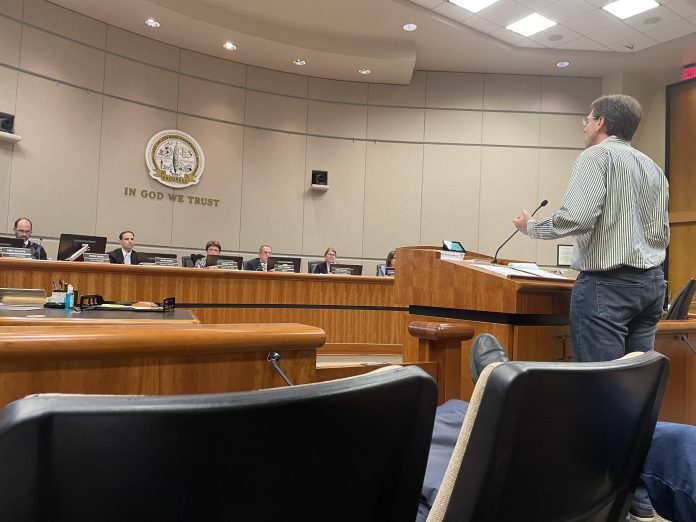
The City of Cypress voted 4-1 in a special meeting Wednesday to sign a Settlement Agreement with plaintiffs who alleged the city’s at-large election system violated the state’s Voting Rights Act.
On a motion by Mayor Pro-tem Bonnie Peat, seconded by Anne Hertz-Mallari, the Council voted to authorize a transition to district elections in the city.
Council members David Burke and Frances Marquez also voted in favor of districting, while Mayor Scott Minikus voted no and exploded into a tirade of accusations with no evidence against the two Democrats on the Council before abruptly ending the meeting.
With the vote, the city has signed on to a 16-page settlement agreement which puts the city under some time pressure to create districts approved by the plaintiffs once the districts are drawn and accepted and decide which two of the five districts will elect their council members in this year’s cycle.
The remaining three districts would be filled with single-member representatives with a phased-in election plan, which could run until 2030. According to city attorney Fred Galante, if the city is not able to draw and accept five-single member districts before March 11, 2024, “the lawsuit will proceed to trial.”
Wednesday’s special meeting had been arranged to accommodate new Council member David Burke, whose wife Courtney had given birth to their second child, a daughter, on Monday. The meeting on Wednesday was tense throughout, yet ended with so much acrimony after Minikus’ allegations that police had to sort residents out after a scream fest erupted after the cameras were turned off in the meeting room.
The meeting began calmly enough, with citizens finally being given their chance to speak on the issue, expressing passionate views on both sides of the by-district election issue for more than 90 minutes.
“I personally feel like an at-large system is far better than dividing our very small city into five districts,” a meeting attendee said. “I believe the lawsuit is misleading, unreasonable, and unjustifiable.”
“The truth will set you free,” said Beth Culver, “but first, it will piss you off.” Culver held up a copy of the CVRA and said it was full of “racist phrases.” She said the CVRA was developed from the Communist Manifesto.
Jaime Crisafi, who said she’s lived in Cypress for 51 years, a single mother who raised three children. “I find this important enough to voice my opinion,” she said, noting that “Asian American Cypress voters are not being disenfranchised by not having an Asian council member. This is identity politics and has no place in Cypress.”
“Many of our residents basically believe in this city and we believe that we want to vote for all of you,” said Pearl Bolter. “This city is amazing,” she said.
Robin Itsler said the districts would create five “mini-mayors.” “That’s what we’re going to have if we have districting, just because someone thinks its racist.”
Glen Button described the CVRA as “un-American” and “poorly written legislation.” He said there has been “accusations, but no evidence” presented by “the attacking attorney” and suggested since districting seemed “inevitable,” the city should, at least, remain in control of the transition to by-district elections.
“I’m opposed to switching to districts,” said resident Barry McGeorge, noting that “district maps are not an easy process. Districts are intended to divide cities,” McGeorge told the Council.
Others were equally passionate in favor of districts, even if their reasons differed.
“I think that it’s a good idea to go to districts,” said Marilyn Reames. “I think it’s a really good idea to have one council member that we can turn to that represents us and each person and it’s so ludicrous to think that they’re going to become individual cities. That’s absurd. They are not all going to be mayors. There’s going to be one mayor,” she said.
“And no, this is not a racist city,” she said, “nor is Los Alamitos or any of our surrounding cities. I said this Monday night. They’re not racist cities and I find that so darn offensive,” she said.
Resident Bob Youngsma suggested the previous council’s determination to appoint Scott Minikus rather than call a special election or appoint Carrie Hayashida when Stacy Berry resigned was the genesis for redistricting. Had the Council not appointed Minikus, Youngsma suggested, “maybe we wouldn’t be having this conversation.”
“I don’t believe in districting either, but maybe it’s a good thing because these good ole boys been running this [city] for too long and they got a lot of backing with money to get themselves elected,” he said. “I do think it’s time to correct some of the mistakes and quit letting big money dictate how our city is operated,” he added.
Many of those supporting districting hoped it would help to get the “dark money” out of Cypress elections.
“I’ve lived a majority of my 62 years in this city. This is the first Council meeting I’ve ever been to. I wasn’t going to speak tonight but this is an important matter,” said Paul Kokkinos. “I’m a registered Republican, and I consider myself pretty conservative.”
Nevertheless, he said “I don’t see this (districting) as a progressive idea,” he said. “A move away from at-large is I believe a good move for the city. For too long, the City Council in this city has been run by a small, organized group of Council members.”
“And, in my mind, they have not looked out for the best interest of the citizens of Cypress. They haven’t done it in a transparent way,” said Kokkinos. “We need to break up what has previously been like a cabal running this city,” he added. “We need to know who is supporting the campaigns,” he said.
“I’m a resident of Cypress, I love it here and I hear the opinions on both sides of the debate,” said Quentin Dentley. “I want to be clear that I think it is important for people to have representation in their local elections. Cypress has some incredibly wealthy community and some with more working class families,” he said.
“I think the districting will provide greater representation for the working-class people of our city,” said Dentley “and I support any and all changes that lead to greater representation.”
Kraemer said recent Council action, both on 3-2 votes, to spend nearly $50 million of taxpayer funds on two city parks that Kraemer termed “gifts to special interest.” “I think districting is an imperfect solution,” said Edwin Kraemer, “but it is a solution.” “Normally I wouldn’t be concerned with it, but I don’t feel represented by those votes,” he said.
When the Council debate began, Council member Anne Hertz-Mallari requested a voice vote on each of the three resolutions and motions that would be required to authorize the process to transition to by-district elections.
David Burke, who Cypress voters ranked as their top candidate in the 2022 election, finishing nearly 10 percent ahead of both Mayor Scott Minikus and Mayor Pro-tem Bonnie Peat, said he supported districting even before he ran for city council.
“I’ve been open since before I was running for council, that I thought the right response was for the city to voluntarily transition to district elections. And that’s not based on my personal views on district or at large elections. That’s because I studied the law, and I realized that it was extremely difficult for a city to win one of these lawsuits at trial,”
Burke, an attorney, said his reasoning was based on potential legal outcomes.
“I believe our own local school board voluntarily transitioned to districts because they understood that every single city that’s fought has lost,” he said, noting some cities have spent as much as $5 million and some as much as $20 million.
“And after reading the case law and the history of elections here in Cypress, I don’t see any reason to believe the outcome would be different. If in my opinion, the city takes this case to trial, we will lose. I don’t think any attorney who works in this area of law feels otherwise.
“I’d rather see $5 million spent on our parks or community programs than on a lawsuit we’re almost certain to lose” said Burke, “so I’m relieved we’ve gotten to this point. I wish it had happened sooner because it is the fiscally responsible thing to do.”
“It’s been a long two years,” said City Council member Frances Marquez, who is a former Congressional staffer with a Ph. D. in political studies, with an emphasis on districting.
After receiving the demand letter in September of 2021, “I recommended that we follow the law and transition to district elections,” said Marquez. “I’ve seen other cities waste millions of dollars challenging a law in a lawsuit they were never going to win,” she said.
Had the city done so, the total expense to the city would have been only $30,000 in legal fees which she said now is likely in the six or seven-figure realm. “I knew it was a no-win situation,” she said, “and I made it clear that it was critical for Cypress to abide by the law.”
“I live right off of Valley View and Katella during the 1980s,” she said. “When I was away at UCLA, we welcomed companies from Asia, Mitsubishi Excuse me, Miss Mitsubishi, Yamaha, Panasonic, Sony, so it should not be a surprise that the Asian population in Cypress is nearing 40 percent, she suggested.
“We need to embrace diversity, especially, you know, we are in this huge economy, and we need to bring people together in this city. I’m tired of the division,” she said.
“For those that know me, this is a very difficult day,” said Mayor Pro-tem Bonnie Peat.
“The California Voting Rights Act is intended to make it easier for minority groups in the state to prove their votes are being diluted,” said Peat, but saying it “doesn’t have to prove a candidate vote because of racially polarized voting.”
She said districting will “deprive our residents for all candidates, and I’ll say qualified candidates and it also draws lines within our city. They’re going to be invisible, but there’s going to be lines,” said Peat. “And what happens is that council members become very focused on their districts and what’s best for them and lose sight sometimes of what’s best for the city.”
While she loves the “diversity” of the city, Peat said the new system is “going to change the lives of everyone in our city, it’s going to change how we run within districts and it’s also going to change the perception of people and how they think they can vote.”
She thanked people for expressing their views, on both sides of issue and asked the public to “please understand that how we vote tonight is based on what’s best for our city and information from experts that we have that you may not be privy to in terms of this particular lawsuit.”
Hertz-Mallari said she would somehow wage a war against the CVRA at the state level, but she too would be voting to transition to by-district elections.
“It’s a tough night tonight,” she said, saying that the CVRA is a “very poorly conceived law that makes it very easy to force at-large jurisdictions like ours into district elections.”
Hertz-Mallari said she believes “the CVRA assumes minority voters always vote for minority candidates. So you look up and see there are no Asian electeds but I know many Asians who voted for me or one of my colleagues” she said.
“My skin color is not same as the voter, that doesn’t mean they don’t like me, right,” she asked? “Doesn’t mean I don’t represent them. So that is a concern for me. The law assumes that voters vote for people that look like them, that is built in to the way the law is enforced,” Hertz-Mallari suggested.
“Because when a minority candidate doesn’t win, then there was a claim of vote dilution or racial polarization. So when the minority candidate doesn’t win, there’s this assumption note within the law, that something went wrong and minorities weren’t heard,” she said. “I dispute that.”
There’s a remedy built into the law. The law assumes that the miniorities will get a better result if there’s a majority of the minorities” in a single district. So the law and these assumptions are troubling to me,” she said. “This law takes away four of my five votes,” Hertz-Mallari said, “and people died to give me the right to vote; to give you the right to vote.”
However, “I participated in mediation, and I’ve become completely convinced that a court would not find in our favor. Hertz-Mallari said she would get involved in “pushing the issue up to the state.” “For now,” she said “voters’ should indulge us and help us along the path of making the best of the situation.”
Minikus, despite the city’s civility, conduct and governance code, went after two Cypress citizens and two council colleagues, calling them out by name and making charges and accusations for which he presented no evidence.
The mayor cast the only vote against agreeing to a settlement, and seemed intent on creating a narrative to cast blame on others for a change in the city’s voting system that many believe was largely spurred by his own appointment to the Council in 2021.
Minikus acknowledged some believe telling citizens that “I’m going to take you through the timeline, beginning with the appointment process, which seems to have started all this.”
At that point, an angry Minikus read a statement that attempted to ensure voters blamed two local women who he mistakenly said were involved from the beginning. They were not.
In short, he accused Burke and Marquez, both Democrats, of being good friends with CRVA plaintiffs Dr. Malini Nagpal and “questionable” Katie Shapiro.
“Because of the people that I’ve just mentioned recently, with Councilwoman Marquez and Councilmember Burke complicit in this lawsuit, they’ve remained close with the plaintiffs,” said Minikus , despite a Conduct, Civility, and Governance Code that bars such accusations in open session.
Minikus then went after both Council members, slinging accusations that fit a narrative but for which he gave no proof, only his vision.
For Marquez, he brought out the greatest hits of accusations that other Council members have used to keep her out of the mainstream since this process began. Even if his timing of events were incorrect, Minikus inferred that Councilwoman Marquez was so committed to districting that she leaked the city’s legal strategy.
“Tell me that you don’t believe that Councilman Marquez was the one who leaked our legal strategy. From day one, she’s had motive and intent to cram this lawsuit down our throats and force you into districts, whether you like it or not. And apparently, she succeeded in doing just that,” Minikus said.
About Burke, the mayor charged, with no evidence that Shapiro has been to Burke’s home several times, and that somehow, Burke had been talking with plaintiff attorney Kevin Shenkman. He also suggested the top vote recipient in the most recent election was some sort of plant.
“If you believe that David Burke just happened to move into our city approximately a year before the election and started showing up at council meetings as a concerned resident. I think you’re sadly mistaken as this was a calculated move to run for office,” he said.
In addition, the mayor suggested, without evidence, that Burke colluded with the plaintiffs.
Burke, said Minikus, “told me he had spoken to Attorney Shenkman over the phone to discuss the lawsuit but then they did not go into specifics with me. Why not? Honestly I was shocked. I asked him if he told this to the city attorney and the city manager and he said that he had not. But it begs the question, why would someone, with a legal background who knows or should have known better not notify and divulge a critical piece of information to the city attorney and the city manager in an immediate and timely fashion?”
“Councilmember Burke confessed he is good friends with Katie Shapiro, who has been to his home multiple times,” said Minikus, though Shapiro said after the meeting that she had never visited Burke’s home.
“Quite honestly, this entire lawsuit and the circumstances that led us here is incredibly disheartening because we’ve had this if you will leftist ideology forced down our throats,” the mayor charged.
Following Minikus, the Council formally voted on three resolutions to jumpstart the districting process, voting 4-1 in favor and Minikus being the only vote against settling the lawsuit.
Angered, both Burke and Marquez demanded equal time to answer Minikus’ allegations, none of which they said was true.
“I don’t think a councilmember should get to spread hateful, vicious lies about each other and then adjourn without giving the other councilmember a chance to respond,” Burke told Minikus.
“I was elected by the people of Cypress, so we need to respond to accusations that you made that are not true and put the city in a very, very precarious legal position,” said Marquez.
Minikus announced the next meeting, Peat made the motion to adjourn, Hertz-Mallari seconded it and it passed 3-2.
Though the meeting was over, citizens and Council members reportedly exchanged emotional outbursts, and since the meeting, Two residents, Marilyn Reames and Edwin Kraemer have penned letters to the city asking Minikus to step down as Mayor. We have reached out to the Mayor for a comment but at press time, had not heard back.
Editor’s Note: Watch for more coverage and the aftermath of the meeting in next week’s ENE.











